France attack: It's now almost impossible to feel safe from Islamist extremism
Under their framework no targets are too small, and no attacks are irrational

France has had to deal with another terrorist attack on its soil today. The scarring images of the Charlie Hebdo attack are still etched in the minds of many, and this morning’s attacks will do nothing but once again highlight the threat posed to our wellbeing by terrorism. The terrorists’ intent was to ram their car into the gas factory and see it explode. A decapitated head had been pinned to a nearby fence, while two Islamist flags were found at the scene of the attack.
What we had witnessed was two individuals who had strived to achieve maximum lethality. Fuelled by the belief of their ideology, their victims had been so dehumanised as to warrant their own complete disregard for humanity. It is not yet clear which Islamist entity was the inspiration for this attack. What is crystal clear, is that violent Islamist-extremism is manifesting both abroad and at home. No “non-believer” can feel safe from it, not even the many Muslims who are constant victims to these organisations: today’s Kuwait bombing is a testament to that fact.
For Islamic extremists, their ideology is wholly fixated within a religious framework in which everything has a symbolic value. Jihadist organisations such as Isis and al-Qaeda are constantly disseminating material that encourages attacks by self-starters, attacks that underpinned our own tragedy in Woolwich when Drummer Lee Rigby was assassinated. Under their framework no targets are too small, and no attacks are irrational: all are believed to demonstrate faith to a higher power.
It is becoming clear that one of the terrorists, Yassine Salhi, was known to the French authorities and was a person of interest until 2008, when the French authorities removed him from their “watch-list”. Herein lies a huge gap in the strategy that the French Government had used to combat this type of extremism. And it begs the question: what if Salhi had been put through a de-radicalisation and rehabilitation programme instead?
If we're going to protect ourselves from any future attacks, then we need to know where to look for extremists. There are three potential types of people within Europe that could carry out these types of attacks. There is the "home-grown" type of terrorist, returnees from foreign Jihadist conflicts, and individuals who are smuggled in from abroad undertake attacks. Isis has already demonstrated their willingness to implement this third strategy. But either way France will not be able to combat this threat purely through the lens of criminality or security. It needs a more robust strategy to prevent these types of incidents happening more often.
We must begin to realise that this ideology has an appeal and is growing. As such, it must be alienated, and pushed to the corners of society. The best way to do this is to strengthen solidarity with those who oppose it. Just like the momentum gathered against racism and fascism over the last several decades, greater collaboration between all who support pluralism, equality and liberalism is required if we are to win this struggle.
Join our commenting forum
Join thought-provoking conversations, follow other Independent readers and see their replies
Comments
Bookmark popover
Removed from bookmarks